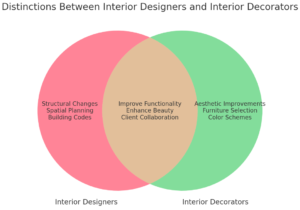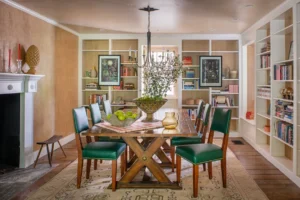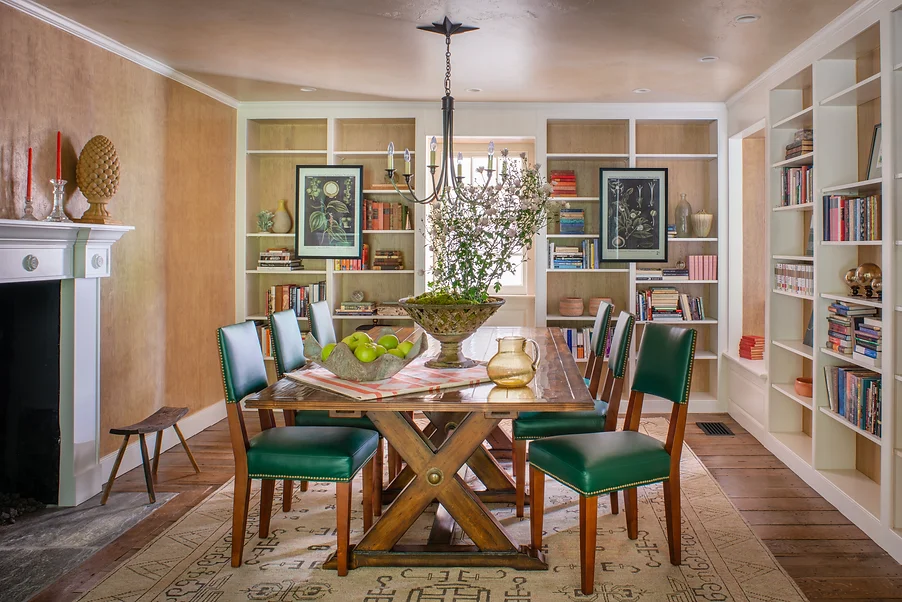Intro: Interior Designing vs. Decorating
What is the Difference Between an Interior Designer and an Interior Decorator? Interior designers focus on structural modifications, spatial planning, and code compliance, while interior decorators concentrate on aesthetic elements like color schemes, furnishings, and accessories to enhance a space’s visual appeal.
Both professionals collaborate with clients to tailor their work to their needs and preferences. They need highly developed, detail-oriented communication skills, along with expertise and confidence in their fields.
When it is time to start planning a room redesign, this distinction becomes pretty important.
If you want to improve the overall function and appearance of a space – Interior Designer.
For visual and furniture enhancements only – Interior Decorator.
Danziger Design, an award-winning interior design firm serving the greater DC area, has more than 25 years of successful interior design experience. Our expertise will speak for itself, and so will our outstanding reviews. Call today!
Key Takeaways
- Interior designers often work on structural changes.
- Decorators focus on aesthetic improvements.
- Education and credentials differ significantly.
- Collaboration with different professionals varies.
- Both roles enhance the functionality and beauty of spaces.

What Does an Interior Designer Do?
Interior designers enhance spaces through structural and aesthetic changes.
They handle tasks like spatial planning, selecting materials, and maintaining safety compliance.
Designers typically work on projects involving renovations, new construction, and major redesigns. Their work often requires collaboration with architects, contractors, and engineers to achieve a cohesive and functional design.
Becoming an interior designer usually requires a bachelor’s degree in interior design or a related field. Additionally, many regions require certification through exams like the National Council for Interior Design Qualification (NCIDQ).
These qualifications highlight a designer’s expertise in building codes, safety standards, and advanced design principles. Interior designers work closely with other professionals to create spaces that are both functional and visually appealing. (1)
What Does an Interior Decorator Do?
Interior decorators focus on enhancing the aesthetic appeal of spaces.
Their main tasks include selecting color schemes, furniture, and accessories to create a cohesive and visually pleasing environment.
They work closely with clients to understand their style preferences and functional needs, translating these into beautiful and practical designs.
Unlike interior designers, decorators do not need formal education. However, many pursue certifications and courses to refine their skills and stay updated on trends. Decorators often collaborate with furniture makers, upholsterers, and clients directly to source the best pieces and materials for their projects.
What is the Difference Between an Interior Designer and an Interior Decorator?
Now that we know a bit about each profession, let’s get into the major distinctions.
Interior designers and interior decorators differ significantly in their education, scope of work, collaboration, and typical projects. Below is a detailed comparison of the two professions.
Comparison of Interior Designers and Interior Decorators
| Aspect | Interior Designers | Interior Decorators |
| Education | Formal education and certifications | No formal education required; certifications optional |
| Scope of Work | Structural changes, spatial planning, building codes | Aesthetic improvements, furniture, accessories |
| Collaboration | Architects, contractors, engineers | Furniture makers, upholsterers, clients |
| Typical Projects | Renovations, new builds, space planning | Home makeovers, style updates, decorating |
Should You Hire an Interior Designer or an Interior Decorator?
Choosing between an interior designer and an interior decorator hinges on your project’s specific needs.
Here’s a more detailed guide to help you decide:
- Hire an interior designer for projects involving structural changes, spatial planning, or compliance with building codes. Designers are ideal for renovations, new constructions, and major redesigns that require technical expertise and coordination with architects and contractors.
- Hire an interior decorator for style updates and aesthetic enhancements. Decorators excel in selecting color schemes, furniture, and accessories to transform a room’s appearance without altering its structure.
Consider these factors to make an informed decision:
- Project complexity: Structural changes versus aesthetic tweaks.
- Budget and scope: Determine how much you are willing to spend and the project’s overall size.
- Collaboration needs: Decide if you need someone to work with architects and contractors or focus on styling and decorating.
With that clarified, we can now shift our focus to finding the right professional.

How to Choose the Right Professional
Selecting the right interior design professional involves a thorough vetting process. Here’s how to proceed:
- Research potential candidates: Use online resources, referrals, and industry directories to find professionals who match your style and project needs.
- Review portfolios and past work: Look for examples of projects similar to yours. This can provide insight into their design aesthetic and versatility.
- Check for credentials and certifications: Verify their qualifications, such as degrees, certifications, and memberships in professional organizations.
- Conduct interviews: Speak with potential candidates to gauge their understanding of your vision and assess their communication skills.
- Discuss budget and timelines upfront: Ensure there is a clear understanding of costs and project duration to avoid surprises later.
Most importantly, you should meet with a well-reviewed and experienced professional to discuss the project and determine if they feel right to you. First impressions are important; a good designer or decorator will show their quality immediately.
Industry-leading Interior Design in DC, MD, and VA with Danziger Design
The differences between interior designers and decorators primarily lie in scope and expertise. An interior designer must plan for, execute, and oversee much more than a decorator. Structural changes require building code compliance, architects, construction crews, and even engineers—there is a lot to interior design.
Danziger Design excels in both design and decorating services. Our experience in design is vast – and so is our list of successful projects. Serving the greater DC area, Danziger Design is proudly connected to the best of the best when it comes to suppliers, contractors, and architects. Our proficiency in enhancing interior spaces is match only by the quality of who we choose to work with or by from.
Trust Danziger Design to exceed your expectations!
Reference:
(1) NCIDQ, Interior Design Exam, https://www.cidq.org/

